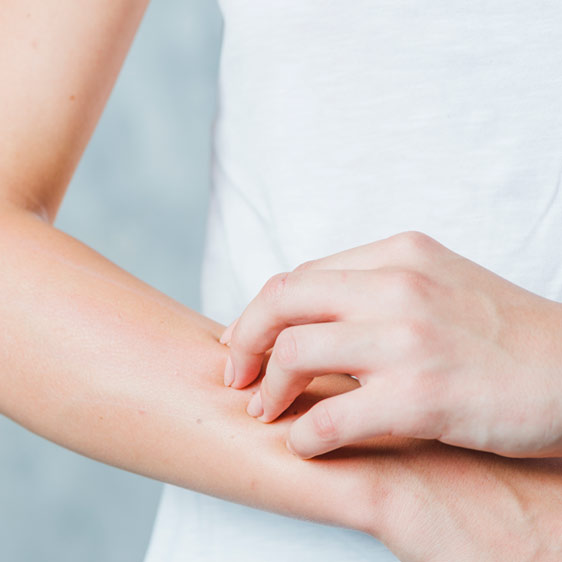
You’re not the only one who enjoys our warm climate. Our region is home to many biting and stinging insects. Thankfully, beyond being itchy and uncomfortable, most bug bites are usually quite harmless. But some insects have some bark to their bite—and their sting. Fire ant bites and wasp, hornet and bee stings can cause intense pain and, for some people, allergic reactions.
Mosquito bites are similarly unpleasant, and some people can develop serious reactions, such as blistering lesions and large hives, that lead to fever and swollen joints, according to the American Academy of Allergy, Asthma & Immunology. In addition, mosquitoes carry diseases, such as West Nile virus and Zika virus.
You can treat most bug bites on your own. However, seek immediate medical help for serious symptoms, such as a rash, fever or body aches. As a result of a bite or sting, some people will develop anaphylaxis, a very severe allergic reaction in which the throat swells and hives, fainting or wheezing can occur. Anaphylaxis can be fatal, so emergency care is crucial.
Simple Ways to Keep Biting Bugs at Bay
Two effective tools for preventing bug bites are a good bug spray and appropriate clothes.
- Use an EPA-registered insect repellent. Apply repellent to exposed skin and clothing, but be aware that some repellents, such as DEET, can damage synthetic fabrics. Always follow label instructions carefully, and do not apply insect repellent to skin under clothing.
- Cover up! Wear clothing that covers your arms, legs and feet, and use mosquito netting to cover babies in strollers and infant carriers.
Home Remedies for Bug Bites
- Reduce swelling and irritation. “A cool compress or indirect ice on the affected area will relieve the swelling,” says nurse practitioner Erin Scott of Beaufort Memorial Lowcountry Medical Group. “To alleviate itching, soak the affected area in an oatmeal bath and then apply cortisone cream. An oral antihistamine can help with itching, too.”
- Take an over-the-counter medication. For painful bites, an over-the-counter pain reliever, such as ibuprofen or acetaminophen, can provide relief. Be sure to read the label and follow directions on dosing. An oral antihistamine can help with itching, Scott advises.
- Leave it alone! “If you develop a blister, don’t break it,” Scott says. “Broken blisters can lead to an infection, as can scratching the bite area.”
Read More: First Aid for Everyday Scrapes and Bruises
Do You Need to See the Doctor?
Bites should get better on their own in about a week. But if you notice an increase in redness or a foul-smelling drainage, go see a healthcare provider or use BMH Care Anywhere to have a video visit with a provider. You can upload a photo of your bite before your consultation, so the provider can see it up close.
As mentioned, if you’re having more serious issues with a bite or sting, or start having symptoms of an allergic reaction, get in touch with your primary care provider or visit your nearest emergency room.
You can now use BMH Care Anywhere for urgent and primary care visits. Create an account today so you’re ready the next time a painful bite or sting interrupts your summer.
